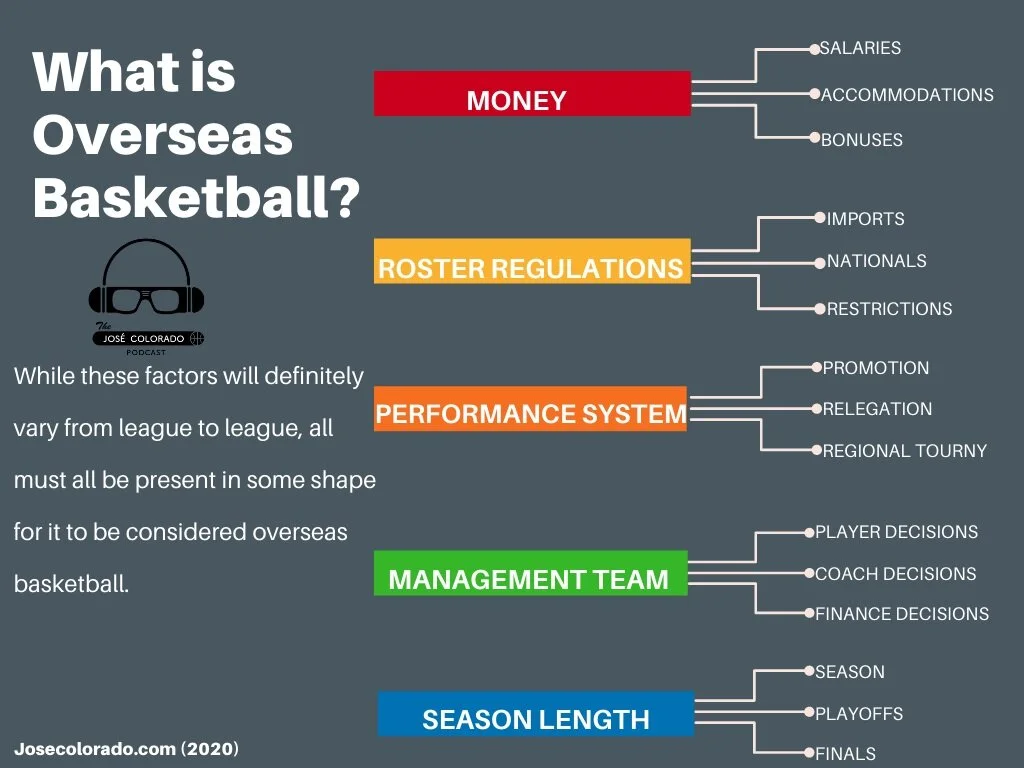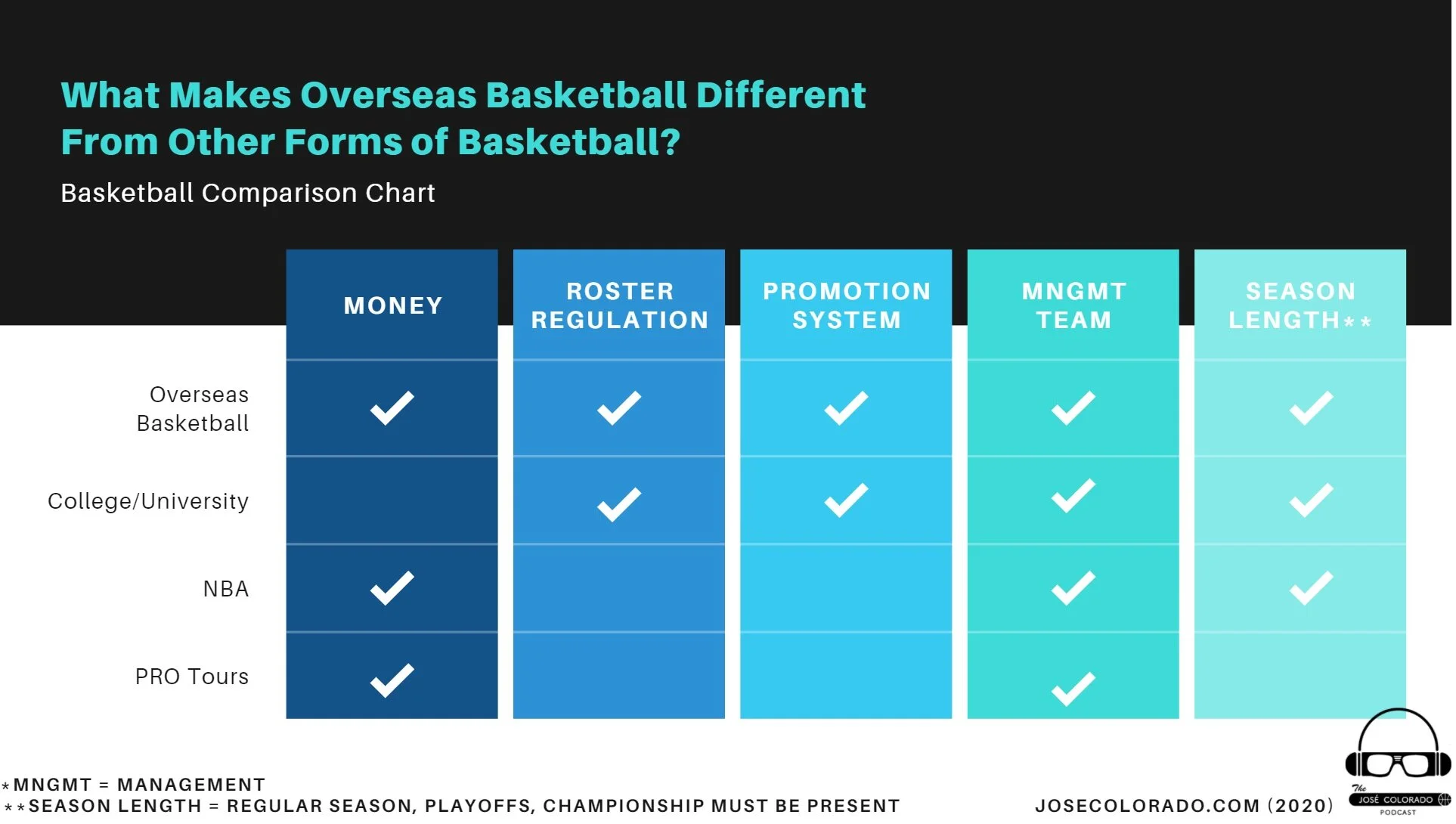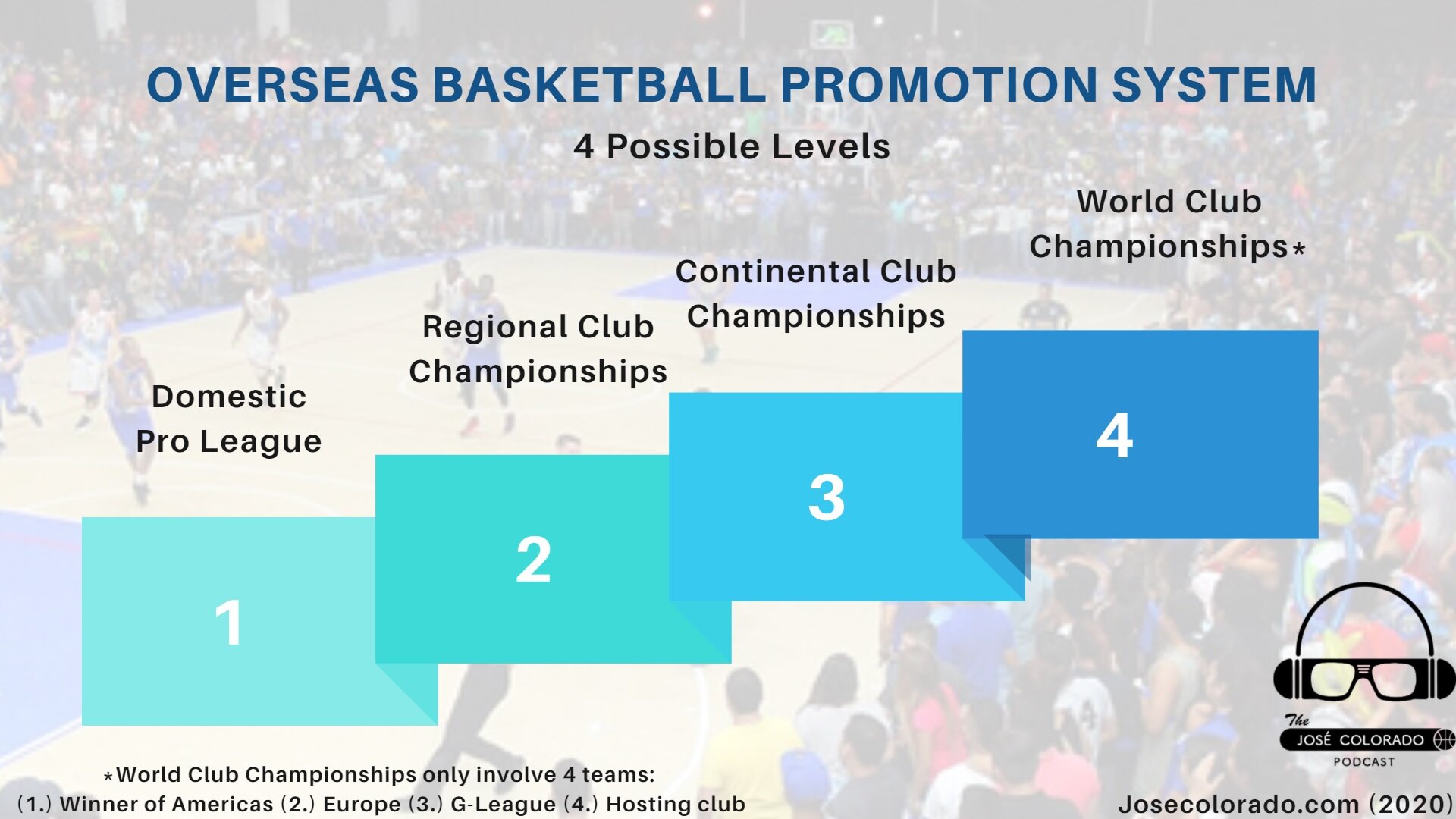What is Overseas Basketball? The 5 Staples of How Overseas Basketball Works [Visual Guide for Players]
If you ask 10 different basketball players their experiences overseas, you’ll likely get 10 different answers.
Some will have loved it, others not.
But regardless of how each individual experience went, typically there will be 5 factors that differentiates Overseas Professional Basketball from all other basketball playing experiences.
So whether a beginner in pro basketball or just a curious learner, I’ll show you a clear way to educate yourself on, “what exactly is overseas basketball?” through this universal guide.
Let’s begin.
definition of overseas basketball
First thing to understand:
Overseas basketball does not mean a player must literally fly across the water and go overseas to play.
Instead pro coaches, general managers and professional hoopers alike all use the term overseas basketball in a very loose sense.
Essentially, overseas basketball is synonymous with professional basketball.
And this makes sense.
Just think:
It would be a ridiculous to say someone from Brazil could travel to Mexico to play in one of the top leagues in the Americas - the LNBP - but since he didn’t cross the water and “go overseas”, we wouldn’t classify it as overseas or professional basketball.
So with that out the way, what exactly is overseas basketball?
Overseas basketball is a form of professional basketball where there are salaries, accommodation arrangements (e.g. food, lodging, transportation), a team management structure (e.g. board of directors, president etc.), a relegation/promotion system and roster regulations all present.
While these factors will definitely vary from league to league, they must all be present in some shape for it to be considered overseas basketball.
With this definition we eliminate many imposters from the equation.
how much money do you make playing basketball overseas?
Now I know what you’re thinking:
Overseas basketball has to involve money. Right?
Yes and no.
While money is definitely the largest consideration in overseas basketball it isn’t the only factor.
And to go deeper:
How much money you make doesn’t qualify or disqualify you as an overseas pro player.
Salaries will vary greatly depending on:
League
Country
Local economy
Skill level
…and much more.
In my massive 100+ country global index of overseas basketball salaries, I outlined how basketball salaries can literally vary from $0 - $4million/year (USD).
Considering that:
It would be pretty foolish of us to discount nearly 75% of the professional leagues in the world simply because they weren’t bringing in the big bucks ($100K+/year).
Now with that being said:
The vast majority of the players on any given roster must be earning money.
It doesn’t have to be a lot of money but it has to be something.
Indeed, many established professional leagues across the world, including Spain’s EBA (4th division) can pay as little as $300USD/month.
But the EBA is still very much a part of overseas basketball.
And $300USD is still more than zero.
Image credit: Josecolorado.com
If the vast majority of players are playing for free, it’s not overseas or professional basketball - it’s a hobby or past time.
Teams could also pay in financial incentives.
These aren’t necessarily money per se but could involve:
Accommodations/lodging (e.g. living rent-free with amenities paid for)
Food money (i.e. paying for meals)
Transportation
Performance bonuses (money for winning certain games/getting stats)
…etc.
How does overseas basketball work?
OVERSEAS ROSTER REGULATIONS: IMPORT VS. NATIONALS
Other than the money, maybe the biggest distinguishing factor for overseas basketball is roster regulations.
Many times, people may think that if you are good enough you will get picked up by professional teams across the world.
But that isn’t exactly how it works since overseas basketball teams work under strict import-national regulations.
What’s the difference between an import and national?
Import: A player who DOES NOT hold citizenship/passport in the country the league is taking place in.
National: A player who DOES hold citizenship/passport in the country the league is taking place in.
For instance:
If I am American and I want to play in France then I must play as an import.
Since I do not have citizenship/passport in the country where the league is taking place - in this case, France - there is no alternative.
But if I had a French passport, then I would play as a national in France.
Why is this important?
Nationals make up the vast majority of every overseas roster
Import slots are limited in each country
This also makes complete sense since one of the purposes of domestic professional leagues is to improve the quality of local players.
In the end then:
Overseas basketball teams can’t just pick the 12 best players for its roster
Instead pro clubs must select the 12 best players for its roster under the import - national regulations
This is a HUGE difference and one of the main reasons overseas basketball is so competitive.
I explain this a bit more in the opening segment of the video below…
Now:
These regulations can get a little tricky as they vary from country to country so I go into greater depth here.
But know this:
Import-National regulations are something entirely unique to overseas basketball and you don’t see this anywhere else (other than college).
Not even in the NBA.
There, teams are free to pick the 12 best players regardless of nationality.
PROMOTION and RELEGATION SYSTEM IN OVERSEAS BASKETBALL
As you could have maybe guessed, overseas basketball teams are playing in leagues.
But more important than that, there is usually a federation that governs:
Team promotions
Team relegations
The overarching rules of overseas teams
Unlike in the 4 Major Sport Leagues in North America, overseas basketball almost always incorporates some form of relegation and promotion system similar to soccer’s system.
For example:
In many overseas basketball leagues, the bottom 3 teams will be relegated to a lower division while the top-placing teams will be promoted up a division.
Promotion ends when hitting the 1st Division.
There is no domestic division higher than the 1st Division.
But teams can still always be relegated from the 1st Division if their performance calls for it.
More exciting though:
Usually, whichever team wins the 1st division title will have the opportunity to represent their entire country/league in larger club championships.
And each continent is striving for a different championship:
In Latin America that means gunning for the Basketball Champions League Americas (BCLA).
In Africa, it’s the Basketball Africa League (BAL).
In Asia, it’s the ASEAN League.
In Europe, it’s the EuroLeague.
Overseas Basketball must have an element of club championships. One example is the EuroLeague in Europe.
overseas basketball owners
While not entirely unique to overseas basketball, this is a necessary element of the definition.
There has to be some form of ownership or management group who is running the basketball operations for the team to function.
That could be a single person or it could be an entire army of people with multiple departments.
This will depend on the league and money.
Regardless of the structure, the owners will have the final say in decisions such as:
Pay
Living arrangements
Player selections
Player contracts
Promotion
Coach selection
…and much more.
when is the overseas basketball season?
Finally:
For overseas basketball to actually be overseas basketball, there has to be a:
Season schedule
Playoffs
Championship series
In terms of the actual season length, I have never seen anything shorter than 2 months.
That means it can’t be a:
Week-long tour
Weekend exhibition series
Group of random matches bunched together
It isn’t important when the season starts and stops.
But more important is to focus on the three elements being present.
CONCLUSION
And there you have it, the 5 elements necessary for overseas basketball.
If you’ll notice none of these factors mentioned talent.
Much like overseas basketball salaries, this is something that will vary widely from country to country.
So there is no way to quantify “how good” an overseas basketball player must be.
Now next time you hear someone saying “they played overseas” at the gym, hopefully you can be ready to understand what they really meant:
Overseas Basketball Definition: What is Overseas Basketball?
Overseas basketball incorporates unique roster regulations with imports - nationals
Salaries/wages must be paid to overseas players in some form
A relegation/promotion system will likely be present in overseas hoops
Overseas Basketball must have some form of a management team to oversee the league/club
Overseas Basketball must have a suitable season length to meet the definition
Got any questions about overseas basketball and what it is exactly?
Comment below. I’d love to hear your feedback.
Jose Colorado is a five-year professional basketball player helping others achieve their goals of pro basketball through a proven, research-based approach.
READ MORE




